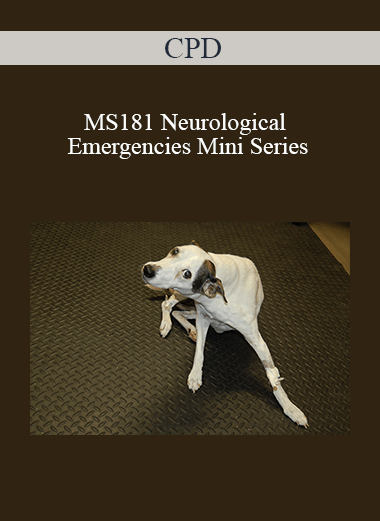Achieve more with the CPD – MS181 Neurological Emergencies Mini Series course, priced at just Original price was: $479.00.$112.00Current price is: $112.00. on GBESY.biz! Explore our extensive collection of over 60,000 downloadable courses in Everything Else. We offer professional, self-paced digital education at up to 80% off original rates. Start transforming your expertise now!
 [Pre-Order] – Deliver digital download link within 4-8 business days after successful payment. Please contact us to get more details.
[Pre-Order] – Deliver digital download link within 4-8 business days after successful payment. Please contact us to get more details.
CPD – MS181 Neurological Emergencies Mini Series course with special price just for you: $479 $114
MS181 Neurological Emergencies Mini Series
£347.00 (+VAT)
12 months access to recordings and course materials is included. Please note that these are webinar recordings and not live events. Full details on how to access the Mini Series will be emailed to you.
- Join Simon R. Platt, BVM&S, Diplomate ACVIM (Neurology), Diplomate ECVN, MRCVS for three 2-hour online sessions
- Comprehensive notes to downloaded
- Self-assessment quizzes to ‘release’ your 8 hours CPD certification (don’t worry, you can take them more than once if you don’t quite hit the mark first time)
- A whole year’s access to recorded sessions for reviewing key points
- Superb value for money – learn without travelling
- Watch the recordings on your iPad!
- This Mini Series was originally broadcast in August 2018!
Programme
Session 1
Acute Brain Disease – status epilepticus and head trauma
In this session, we will discuss a practical evaluation and treatment plan for 2 brain emergencies. The first emergency is status epilepticus. Continuous seizure activity requires rapid patient evaluation and simultaneous treatment. The plan for both will be presented in a step-by-step approach which will focus on which drugs to give, what to expect from them and what to consider if they fail. Head trauma is the second emergency to be addressed and during this session, we will describe an approach to evaluation which will help guide treatment recommendations and understand prognosis in an individual case.
What you’ll learn:
- Causes of status epilepticus
- Initial evaluation of patient with status
- Step by step treatment approach to dog or cat with status
- Causes and signs of increased intracranial pressure
- Practical evaluation of head trauma patient
- Step by Step approach to treatment of a head trauma case
Acute disorders the Head and Face – vestibular disease and the other cranial nerves
The cranial nerves control the functions of the head and face. This session will address the most common acute cranial nerve dysfunction, vestibular disease, addressing how to localize the origin of the disease and covering the major causes and treatments for each localization. In the second half of this session, we will cover other common acute cranial nerve dysfunctions which include dropped jaw, trismus, masticatory muscle atrophy, facial paresis and Horner’s syndrome.
What you’ll learn:
- Clinical signs of vestibular disease
- How to localize peripheral vs. central vestibular disease
- Differential diagnosis of peripheral and central vestibular disease
- Lesion localization for common cranial nerve dysfunctions such as dropped jaw, masticatory muscle atrophy and Horner’s syndrome
- Differential diagnosis for common cranial nerve dysfunctions such as dropped jaw, masticatory muscle atrophy and Horner’s syndrome
- Diagnostic approach to patient with disorders of the head and face due to cranial nerve dysfunction
Systemic causes of Neurologic Crisis – toxicity and metabolic diseases
During this final session, we will focus on systemic heath causes of acute neurologic dysfunction. In the first half of the session we will address the toxins that can be responsible for brain disease, what signs that they cause and what treatments are available. We will approach this problem from a practical standpoint that is based upon the common situation of being unaware of the responsible toxin and knowing that toxins can either excite or depress brain function. In the second half of this session, we will cover the common metabolic diseases which can result in brain dysfunction and these include hepatic encephalopathy, hypoglycemia, electrolyte disturbances and nutritional deficiencies. We will address the common clinical signs, diagnostic approach and treatment recommendations.
What you’ll learn:
- Common clinical signs of neurotoxicity
- Standard approach to the management and treatment of suspected neurotoxicity
- Common neurotoxins, their specific signs, how to treat and prognosis
- Common clinical signs of metabolic encephalopathy
- Common causes of metabolic encephalopathy which will include hepatic encephalopathy, hypoglycemia and electrolyte disturbances
- Common causes of metabolic encephalopathy which will include hepatic encephalopathy, hypoglycemia and electrolyte disturbances
- Diagnostic and treatment approaches to the case with suspected metabolic encephalopathy
CPD|CPD – MS181 Neurological Emergencies Mini Series|MS181 Neurological Emergencies Mini Series
Invest in endless knowledge with the CPD – MS181 Neurological Emergencies Mini Series course at GBESY.biz! Gain lifetime access to premium digital content designed to fuel your professional and personal growth.
- Lifetime Access: Unrestricted, permanent access to your purchased courses.
- Unbeatable Value: Save significantly with prices up to 80% less than direct purchases.
- Protected Payments: Complete your transactions securely.
- Empowering Skills: Learn practical, in-demand skills for immediate application.
- Immediate Download: Access your course content instantly after purchase.
- Any Device, Anywhere: Study on your preferred device with full flexibility.
Discover your next opportunity with GBESY.biz!
![GBesy [GB] GBesy [GB]](https://gbesy.biz/wp-content/uploads/2023/05/gbesy-Logo-full-100.png)
![GBesy [GB] GBesy [GB]](https://www.gbesy.com/wp-content/uploads/2023/05/gbesy-Logo-full-100.png)



 Purchase this course you will earn
Purchase this course you will earn 




Reviews
There are no reviews yet.